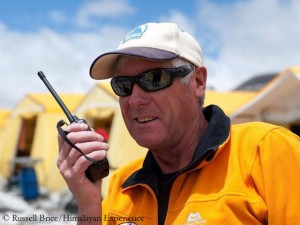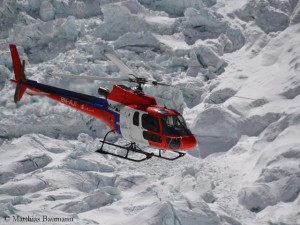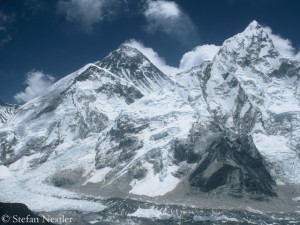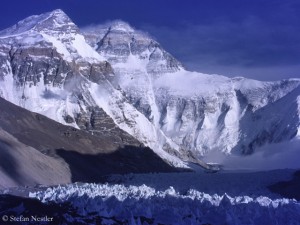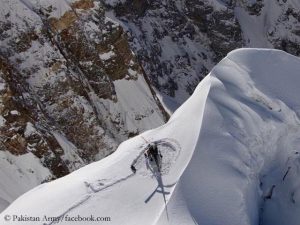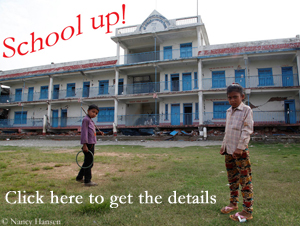Russell Brice points the finger
He kept silent for weeks, but now he has found very clear words. “This is my 20th year of operations for Himalayan Experience but never before have I experienced such a variety of emotions as I did this year” writes Russell Brice at the beginning of a five-part series of reports about what happened on and around Mount Everest this spring. At this point I can only sum up the content but you should really take time to read Russell’s first hand reports in its full length. The owner and expedition operator from New Zealand was at Everest Base Camp when the devastating avalanche went down over the Khumbu Icefall and killed 16 Nepalese climbers on 18 April. “It appears that there was already a traffic jam in this area at the time of the avalanche, so it is not surprising that there were so many killed and injured.”
Where did the money go?
More than 150 people were in the Icefall at that time, Brice estimates. He commends all people who got involved in the rescue operation that started quickly after the avalanche: “To see so many people running up the hill un-hesitantly putting themselves in danger in order to help others is most creditworthy.” Russell blames the Nepalese Tourism Ministry for the fact that on the day of the avalanche there were only three of 39 Liason Officers at Base Camp. “Remember that each Liason Officer is paid $ 2,500 plus travel expenses so we as expedition teams have just paid a little under $100,000 for nothing which begs the question as to where did this money actually go?”
“Corrupt people”
“Without consultation” the Ministry sent a large military helicopter to Pheriche to collect the bodies of the victims and take them to Lukla for further identification by the police, the 61-year-old reports: “A job that the Liaison Officers at Base Camp should have been able to do. Then the military helicopter had a mechanical fault so apparently had to stay overnight causing total indignation to the grieving families.” Russell excoriates the Ministry, especially the current Under Secretary Madhu Sudan Burlakoti: “Sometimes we have a good person who wants to understand whilst at other times like right now we have corrupt people who do not want to be helpful. Having been to several meetings in the past week with the Under Secretary, I am appalled by the lack of understanding, the conceited and abusive manner that this man deals with my staff and others of considerable repute.”
Same faces, same problems
The expedition operator from New Zealand confirms that some Sherpas in Base Camp were ready to use violence. Russell asked his Sirdar Phurba Tashi if the Sherpas were still prepared to climb on Everest and Lhotse. “He told me that they all were, but advised that it would be unwise for Himalayan Experience to continue with the expedition as word was around that other Sherpas would break the legs of our staff and would firebomb our Kathmandu offices if we continued. It was with deep concern and reluctance that I eventually decided that it was best to cancel our expeditions.” Brice accuses certain Sherpas of having poisoned the atmosphere not only this spring but also after the avalanche on Manaslu in fall 2012 which killed eleven climbers and in the dispute with Simone Moro and Ueli Steck in spring 2013. “I see the same faces causing problems.”
They did not respect the agreement that each team should be able to make its own decision to climb or not, and that there should not be pressure put on teams, says Russell. “For this I have totally lost the respect of that particular Sherpa community that pushed these events through and hijacked the Everest season.”
Facing difficult times
After weeks of negotiations with the Tourism Ministry in Kathmandu the New Zealander is disenchanted. “This is the very best opportunity that the Ministry has ever had to make meaningful and progressive changes that will be appreciated by the Sherpa community and would demonstrate to the international community that they are serious about administration of this important tourist business”, writes Russell Bruce. “But no, they have done nothing, which is disappointing. What is even worse is that they are now embroiled in corruption, lies and deceit.” Russell expects that Nepal is facing difficult times. “It is now hard for the climbing and sponsorship community to have faith in the administration of mountaineering tourism in Nepal, the long term effects will probably be quite drastic and this will have an effect on the amount of employment of the local community; not only Sherpas, but hotels, airlines, food suppliers, porters, lodges, taxi drivers and even post card sellers.”



